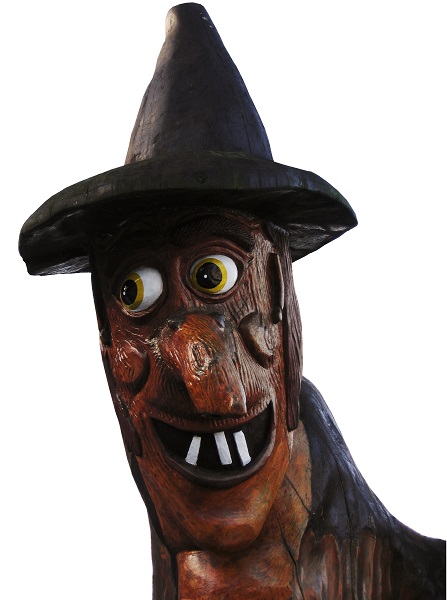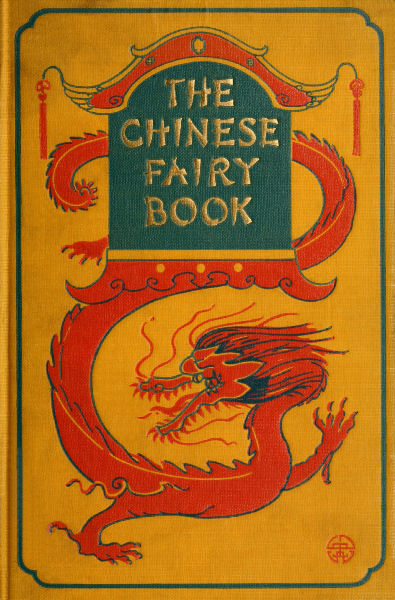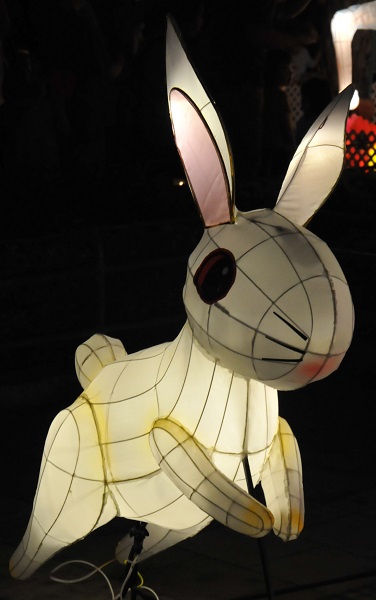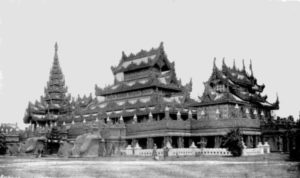THE COMMAND OF THE KING (Told on the Pagoda TALES OF BURMAH, 1895) by Mimosa
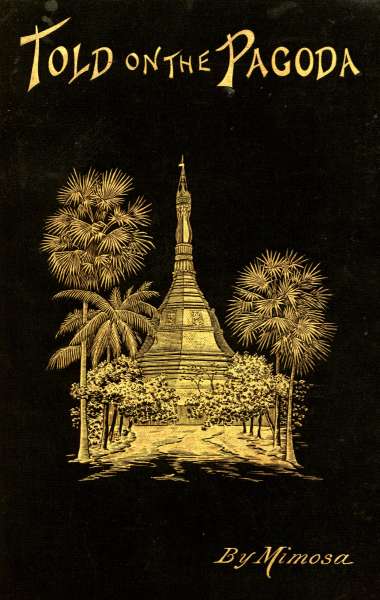
THERE was a King of Amarapoora, who reigned in a time long past.
He was young and beloved, and fair of form and face, and his people lived but to obey his lightest wish. He dwelt in a palace of crystal, surrounded by gardens, of whose beauty no tongue could tell. He had money and lands and gems, and beautiful wives and unnumbered treasures, gathered from all lands.
He could have whatsoever he willed, and go wheresoever he listed. His days and nights were one long dream of gladness.
No enemies plagued him; no troubles of any sort visited him; his coffers were well filled, and his ministers were faithful and wise; and yet, in spite of all, he was weary of everything, more weary than he could say.
He drank from a goblet of gold, rimmed with a band of pearls, and his clothes were studded with rubies and emeralds; he was flattered and courted and envied as no monarch had ever been envied before, and he was more discontented than the poorest subject in his realms.
Above and around and about him was all that is most conducive to happiness, but within him were fatigue and desolation.
All that he had ever wished for had been given unto him; never had the gods left unanswered his prayers; other and better men’s they turned a deaf ear to, but not so this King’s, and now he had nothing more left to crave for.
He had supreme power vested in his hands, but he was indifferent to it; he owned everything that the heart could desire, and those very possessions were killing him.
For the trail of the serpent of satiety lay over his garden of Eden.
Never had his eyes rested on disease or want or poverty, or anything that could distress his mind.
All gifts and graces had been showered upon him; his sins were buried in oblivion, or cited more admiringly than the virtues of others.
When he went abroad on his white elephant, with its trappings of scarlet and silver, the very air was perfumed with otto of rose, while the people bowed and kissed the dust through which he passed.
Attached to the palace were many hundreds of officials, players, dancers, jugglers, and clowns; for the King sought only one thing, and that was—Amusement; of which, in no matter what form it was presented to him, he soon tired.
Constantly was the country being searched for some one with a ready wit, an inventive tongue, or a nimble foot, to pass the hours for the Lord of the City of Gems.
Tellers of marvellous stories, more wonderful than the Arabian Nights, had come, and tried their little best to please.
There were those who travelled specially to other countries, but to return and tell him of all that they had seen, and of how inferior all lands and rulers were when compared with their own.
Dancing women, with the classic limbs and straight black brows of Egypt, sought his favour.
Eyes that were as loadstars in their brilliancy wooed him with a thousand glances.
Circassian women, with sun-flecked tresses, were his willing slaves.
Men of great learning asked nothing better than to gain his ear awhile, but all fatigued him soon.
And, like a child, he cried for something new.
Then one day a stranger from India presented himself at the great gates of the palace, saying that he brought a game called Chess to teach the King. They who loitered round the entrance bade him scornfully to “begone.” What would he of the Golden Feet do with red and white figures like that? they contemptuously asked.
But the Indian protested, craving humbly to be granted an audience. Then one, who was more kindly than the rest, led him through the green, silent gardens, with their aisles of gorgeous roses; by spray-splashing fountains, fringed with the lotus-flower; up a flight of marble steps on to a terrace where peacocks strolled; through carved doors, from which stretched an endless vista of halls and rooms filled with numerous attendants, who formed a mass of marvellous colour; carpets and rugs of velvet-like softness were strewn about; ivory of wonderful workmanship; things of all precious metals, together with stuffs of delicate hues and lovely texture; to a chamber handsomer than any that had gone before, where at one end, seated on a couch, clad in an odd, rich fashion, and shaded by a large umbrella, was the King, his bare feet resting on a stool; to his right was a golden spittoon, while to his left stood a slave holding a jewelled betel box and some green cigars.
The Burmese prostrated himself almost full length, motioning the Indian to do likewise, explaining at the same time the object of their presence.
His royal master received them graciously, inquired into the merits of the game, finally declaring that he would be taught it there and then.
From that time forth he devoted himself to play with an eagerness entirely foreign to his nature. He paused for nothing, never going without the palace. The days seemed not half long enough. The courtiers were inclined to congratulate themselves on having at last found something that seemed likely to continue a favourite with the King, until they saw how high[124] the Indian was rising in his favour, being loaded with money and presents, and thereby becoming a cause of bitter envy and jealousy on the part of the Burmese ministers.
Nor did his haughty, overbearing manner tend to soften their resentment. Many were the plans that they made to cause his downfall, but in vain. Every one of the plots failed, while he whom they conspired against seemed to grow but dearer to the Lord of the Rising Sun.
Time passed.
Then one came called Nicomar from a great distance, who brought painted cards and dice wherewith to amuse the monarch, the like of which had never been seen before. And the King, like a spoilt baby, was delighted with this new toy, and thrust away the chess from his sight with disdain.
And those round about were so glad of the change that they hardly grudged the new-comer the honours that their royal master began to speedily heap upon him.
The days went by, and His Majesty did nothing but recline on his crimson and golden cushions, playing and rattling the dice-box.
Then, after awhile, he took to enlivening the game by hazarding large bets with his teacher—bets which generally meant the performance of impossible feats by Nicomar, with many penalties attached to their non-accomplishment.
Often and sorely was Nicomar’s subtle mind perplexed to devise means of circumventing his master’s wagers, and of distracting his attention to other and more entertaining matters. Nicomar lived always in fear of losing his place at the palace. Inwardly, he hated this unreasoning and unreasonable monarch, whom nothing pleased for long; outwardly, he was the most docile, obedient, and fawning of servants.
Carefully did he veil his night-like eyes, lest the hatred that shone in them sometimes might be read by those around.
Prostrate before the King, he seemingly lived but for his smile.
The burning days and the sultry nights he devoted to his service; while others slept he sat wakeful, thinking out new forms of amusement, new ways to distract the King, and enable him to retain that place which to him, hitherto most poor and friendless, was as the sorcerer’s golden apple.
For Nicomar there was but one god—and that god was wealth.
He laboured and strove for and endlessly desired it.
A year went by, and still he remained the favourite, and he began to feel a little more secure and at ease….
“Nicomar,” cried the King one day, as they sat together in the sunset glow, “I have resolved that you shall put milk where the sea now is. I have tired of water, and I desire instead an ocean of milk.”
Nicomar stared in dismay.
“That which your Majesty wishes is impossible,” he made answer.
The King frowned.
“Impossible is no word between you and me. That which I command must never be impossible,” he exclaimed angrily. “Hitherto you have obeyed my orders; do so now.”
The Indian trembled, but dared not protest.
“Fill up the sea with milk in fourteen days from now and your reward shall be all that even you can desire;—fail to do so and you shall die by all the tortures possible within an hour. Do as I say and your place shall be the very highest here: your power shall be well-nigh limitless, your name shall be on all lips; men shall crouch at your feet; you shall have a finer palace and greater wealth than any in the land. Save myself, you shall be great and free, while those whom you love shall be raised also.”
Nicomar salaamed silently.
The King continued:
“You have known what it is to be lowly and despised; you have been mocked and reviled at,—what greater or sweeter vengeance then to see those very people bow down before you your slaves? I desire this thing so much that any price you like to name I am prepared to give.”
The Indian answered never a word.
He knew of old that once the King commanded it was useless to do aught but comply.
This reward, great as it was, could never be his, for to earn it was beyond anybody’s power.
“Begone, now,” continued His Majesty, “and return in fourteen days’ time to claim your prize, or——” and his gesture was more eloquent than words.
Nicomar, with sorrowful, halting gait, went from his august presence.
He sought without delay the quietude of his own rooms. He was well-nigh distracted. From many difficult predicaments he had with consummate tact and skill extricated himself, but from this there seemed no escape.
He beat his breast and tore his hair. He consulted the wise men and the stars; looked for this sign and for that; prayed long and fervently, and propitiated the gods in many ways, but all to no purpose.
He took no food or rest; he dared not think of what awaited him in the near future.
So a week went by, and he was no nearer finding a loophole through which to escape.
On the seventh day he sought the King, and craved humbly to know if he had understood him aright, or had he been but jesting with him.
He lingered but a short while in doubt.
His Majesty was deeply incensed at being questioned, and let the full torrent of his displeasure fall upon the head of his luckless servitor.
Swearing many oaths by the sacred hairs of Buddha that his will should be obeyed, he had him thrust ignominiously from his presence.
Then Nicomar went from out the palace and the city far into the lonely country, seeking he knew not what. For days he wandered wearily through thick jungle and silent forest ways, stepping but slowly in the long, dank grass.
He suffered greatly, and suffered without hope.
On the fifth day he came to where a broad river flowed and sparkled between high green banks.
Some Burmese, driving bullocks, were resting beside it, while in the distance were a few mud huts.
Nicomar, who was footsore and faint, sank down at the foot of a banana tree.
His garments were torn by branches and brambles, his sight was blinded by the sun, his mouth parched with thirst.
Idly he watched the Burmese from where he sat.
Soon it became apparent that they desired to cross that glittering expanse of water, but evidently knew not how to accomplish it.
Nicomar, tired of thinking of his own miseries, grew unconsciously interested.
Three of them twisted their silk pasohs up about their waists, and tried to wade the river; but it was too deep, and they returned, seemingly much perplexed.
Then they consulted together; whereupon one among them—evidently against the desire of his companions, as their gestures betokened—took the rope of his bullock between his teeth, and diving into the river, with a good imitation of swimming reached the other side.
His fellows watched the performance with open-eyed wonder, but could not be induced to follow his example.
Nicomar, looking on, thought that the young man must have a mind full of resource, and so determined to seek him and consult with him. He could not have told what was exactly the impulse that urged him to this course, but he rose, and staggering a little because he was faint, made his way to the river bank.
The young fellow leant a very interested and attentive ear to the strange story that Nicomar told to him. When he had finished he took him to his hut and gave him a meal of rice, then bade him go over the tale once more in all its details.
Whereupon he asked at the conclusion—
“If I, poor and ignorant, satisfy the King that his command can be performed, what will you give unto me?”
Nicomar, trembling with joy and incredulity, promised him one half of what he had and the hand of his daughter in marriage.
Then the Burman said—
“To-morrow we will seek the King.” More he would not say, but sat in the dusky gloom of the coming evening, smoking.
Nicomar, with the great weight of his troubles somewhat lightened, slept heavily.
On the morning of the fourteenth day Nicomar prostrated himself before his master.
“Well,” asked the King, “come you to claim your reward?”
The Indian bowed his head in grave deferential assent.
“And so you have obeyed my order?”
“I but wait for your Majesty to perform your part first, then I will without delay do my share.”
The King hastened to ask the meaning of such an answer.
“Your Majesty commanded me,” replied the Indian, “to fill up the sea with milk, which I am quite ready to do; but your Majesty did not command me to take the water from the ocean, and until that is done it is impossible to fill it anew. If your Majesty,” continued Nicomar, “will but dispose of the water——.” Then he paused timidly, waiting the King’s response. He had done as the Burman had instructed him, and he feared the result.
For a long while there was silence, and those round about trembled with apprehension, for they guessed not in what wise their master would take such a reply.
At last he smiled, for although he had many grave faults, he was not unkindly or averse to owning himself baffled.
Then he said—
“Nicomar, thou art cleverer than I thought.”
At which words hearts that had stood still from fear beat once more.
“The sea exists,” said his Majesty, after a pause, looking round on his Court, “as it existed before we were, as it will exist when we have all passed away and our names have been forgotten.”
If you liked this story, leave me a comment down below. Join our Facebook community. And don’t forget to Subscribe!
Read more folk and fairy tales from Burma.







